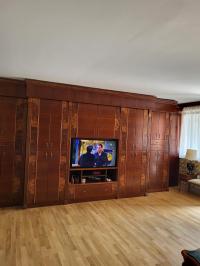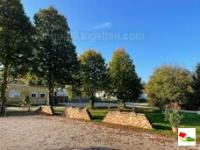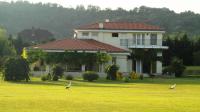Siofok is a lovely little town in Hungary that is located on the southern bank of Lake Balaton. It is a popular holiday destination thanks to its beautiful beaches and good climate; indeed, it is known as the “Rimini of the East”. In Siófok there are more hotels, discos and restaurants than house ...
First-rate investments at low prices in Hungary
Siofok is a lovely little town in Hungary that is located on the southern bank of Lake Balaton. It is a popular holiday destination thanks to its beautiful beaches and good climate; indeed, it is known as the “Rimini of the East”.
In Siófok there are more hotels, discos and restaurants than houses and apartments. The lake attracts above all young people in search of opportunities to have fun, but it also offers enjoyable experiences to families and elderly people.
Balatonfured, on the western bank, is a centre surrounded by enchanting rolling hills and vineyards that hosts nineteenth-century villas. It is possible to practise any kind of aquatic sport on the lake, thanks to its calm and warm waters that can reach 28° and have not been affected by the recent ecological disaster. The Ministry of the Interior stated that water springs and supplies in areas surrounding Budapest, Lake Balaton and Lake Héviz – the largest thermal lake in Europe and one of the biggest in the world – are not in danger; on the contrary, it is safe to stay and drink water there.
About one million tourists arrive every year on the banks of the lake, 20% of which come from Germany, Croatia, Austria and Italy.
Kesztheley is the most important town located close to Lake Héviz. This is the favourite holiday destination of German and Austrian holidaymakers for its proximity to the national frontier.
Local real estate agents believe this is the best area to make a property investment, thanks to the building of a new M7 motorway that connects Budapest to Zagreb – in Croatia – and Ljubljana – in Slovenia. This is the opportune moment to make a real estate investment since prices have fallen by 20% due to the economic crisis and owners are often forced to sell and are ready to grant further discounts. Starting from 2011, the Government will finance energy saving interventions up to 70% to all EU citizens and in 2015 the country will join the Eurozone.
Experts say the Balaton area is ideal to buy a holiday home, even if for a steady return on investment it is better to buy in Budapest. Those who want to make a buy-to-let investment should buy high-level properties to benefit from the increasing demand of first-rate dwellings situated close to the beaches. A high-level apartment in a condominium with swimming pool, sauna, reception and garage with view over the lake costs 2-3 thousand euros per square metre.
The English Scd Group is implementing the Balaton Development Programme for the building of a tourist complex including hotels, holiday villages and high-quality apartment hotels. The project required a € 450-million investment.
Prices around the lake vary a lot and it is possible to purchase a medium-level house for 500 euros per square metre and building plots of land in good positions for 20 thousand euros. There are not restrictions for citizens of the European Union and the overall costs amount to 5% of the property value. Due to the economic crisis, most real estate agents have renounced the commission applied to buyers. The capital gain is taxed at 25%, but it decreases through time and is cancelled after the fifth year.
Budapest is the best example of how Hungary is trying to get rid of the economic crisis. Many renovation and modernization works are taking place in the capital city and an army of workers is building new bridges and new underground lines. This is also an attempt to stem unemployment. This situation represents an excellent opportuntity for property investors: real prices are at the same level as they were in 2000 and analysts expect a revaluation thanks also to Hungary’s euro entry in 2015.
Ninetheen-century palaces grant a long time durability and value preservation. The average price is around 1600 euros per sqm but it rises to 2600 euros for high-quality palaces with view on the Danube. In central areas prices range from 500 euros per sqm – for apartments in need of renovation – to 3000 euros per sqm depending on the position and the conditions of the building.
Prices in Budapest are lower than in the other European capitals, but they are expected to reach the level of towns like London within 10-15 years.
Experts advise property investors to concentrate on the high-quality or low-level properties, avoiding the intermediate sector.
Click on the following link to know more about the real estate market in Europe:
- Investing and living in the region of Salento
- Italy: prices rise in the areas served by low-cost airlines
- Scotland: Real estate market trend in Edinburgh and Leith
- Switzerland: it is difficult for foreign investors to buy a home in St.Moritz
Related Insights
-
First-rate investments at low prices in Hungary
Real Estate Listings
For sale 3 Bedrooms, Hungary, Budapest, Budapest, kanai ut

For sale
3 Bedrooms
112 m²
For sale Other (Commercial), Hungary, Békés, Gyula, Eleki út

For sale
Other (Commercial)
2800 m²
For sale Terraced House, Hungary, Siklos, Villany, Orgona utca

For sale
Terraced House
70 m²
For sale Warehouse/Barn, Hungary, Borsod-Abaúj-Zemplén, Szerencs, L

For sale
Warehouse/Barn
5330 m²
For sale Bar/Restaurant/Nightclub, Hungary, Győr-Moson-Sopron, Miháyi, Hunyadi utca 26

For sale
Bar/Restaurant/Nightclub
2050 m²
For sale 2 Bedrooms, Hungary, Békés, Bekes, Vásárszél

For sale
2 Bedrooms
60 m²
For sale Other (Commercial), Hungary, Szabolcs-Szatmár-Bereg, Baktalórántháza, Baktalórántháza

For sale
Other (Commercial)
15000 m²
For sale Development Property, Hungary, Veszprém, Kisapáti, Kisapáti-hegy 893. hrsz.

For sale
Development Property
3113 m²

